Interview with Mike Seal – Guitarist Extraordinaire of the Jerry Douglas Band

Introduction
He's an extraordinarily talented guitarist whose musical interests range from jazz and bluegrass to classical music. In 2016 he was invited to join the Jerry Douglas Band -- master musician and dobro virtuoso Jerry Douglas is a three time winner of the CMA Musician of the Year Award. The band's latest album was recently nominated for a Grammy, and should it win that would be Jerry's 15th Grammy award. The album fuses jazz, bluegrass, swing, soul, and blues, and explains why Jerry Douglas invited Mike Seal to join his band of amazing players.
Mike’s grandfather was a gifted self taught gospel guitarist in rural Virginia, and his older brother, Rob Seal, is a multi-instrumentalist (guitar/mandolin/violin/banjo) who is active on the bluegrass music scene. Mike is married to a professional musician who is also a very accomplished lap steel guitarist and dobro player. She fronts a band with her equally talented sister on vocals, guitar and mandolin. Mike has been active on the Southern music scene for over a decade and is based in Nashville, Tennessee.
Musical intro, Mike Seal performing J.S. Bach on electric guitar.
Interview
Musical Family?
AB: Usually I ask this question and I don't have any idea what the answer will be. But today, if I had to bet, I'd bet a thousand dollars that at least one of your parents is a musician, or at least someone who loves music and plays an instrument. Would I win that bet?
Mike Seal: Yes, technically you would. My Mom is a musician, not by trade, but she grew up playing piano in church and singing in a choir. Her father, my grandfather, was a fairly gifted folk and gospel guitar player in Southwest Virginia. So I remember hearing him as a kid and being completely blown away, and thinking, how could anyone ever do that on a guitar?
AB: What was his style like.
Mike Seal: Very much out of the tradition of Doc Watson and players in that vein. He grew up playing gospel, and he was a man who never saw the ocean in his entire life. It was just something he always did.
AB: Did he have training, or was it kind of a natural thing for him?
Mike Seal: It was just home grown, from playing in churches around where he lived. It was extremely rural, I think he had one opportunity to join a bluegrass band when he was growing up, and turned it down to stay home and have a family. So aside from that, those were the only musicians. Though my older brother is really the guy who got me playing. He's four years older than I am, so he started at a very young age and I wanted to emulate him every step of the way.
AB: Is he still playing?
Mike Seal: Actually he's a great player, he's very much a bluegrass musician at this point. He grew up with rock & roll and other kinds of music, but yeah he plays banjo, violin, guitar, and mandolin – all fairly equally well.
Musical Training
AB: Wow. Well how about you, when did you start out?
Mike Seal: I think my parents put me in lessons on piano when I was five, my brother had already been taking lessons for a few years. I continued on piano until my teacher died, she was an elderly lady. Most of the time she didn't get my name right, but we enjoyed the lessons, and she taught us to be proficient at reading at a young age. So that was really a great benefit.
I continued with that with a new teacher until I started guitar at about age nine.
AB: Did you continue with piano, or did you completely give it up for guitar?
Mike Seal: Oh no, I continue to play today, and I took formal lessons through high school. My brother and I continued to study with a lady where we grew up, her name was Nancy Hackman, and she was a conservatory trained classical pianist. So she had a really solid foundation to teach from. Her arthritis was so bad in her old age that she didn't play anymore, but we knew that she was very knowledgeable about what she was doing, so we played a lot of the sonatinas and sonatas, and piano works that you would be presented with as a young student in that vein.
AB: How about guitar, was it formal instruction there too, or were you and your brother just picking that up?
Mike Seal: It was formal in that we were reading the Mel Bay method of guitar. It was a little bit interesting because we took our guitar lessons from our piano teacher, and she did not play guitar. That didn't really bother us – we were so young. Because what she was really skilled at was reading knowledge, and getting us to sight read. She had perfects ears and she could hear when we made a mistake, but she couldn't convey any technique to us.
So we weren't learning how to hold the instrument, or properly hit the string, how to hold our hand, or the angle of how the neck sits. So we were basically playing classical music on steel string bluegrass guitars. But we learned to read at a fairly high level at a young age because she was such a profound teacher in that way.
AB: That's a really unusual approach, I mean being taught guitar by a piano teacher with arthritis – you can't make that stuff up!
Mike Seal: She used to fall asleep during the lessons, and we have a lot of stories about Miss Hackman. She had a dog that barked incessantly, it was in a small cage in the kitchen, so that was always a background noise. She had so many students, maybe 40. So we would get in there in the evening, about 7:30, so a lot of times she would just take a nap during the lessons. She was a rotund lady, and she could set her chin on her bosom and nod off, and you wouldn't notice that she wasn't with you anymore until you finished a song and she didn't correct you.
AB: Were you and your brother in there together, or did you do it separately?
Mike Seal: We would go together and he would have the first 45 minutes and I would have the second, and we would split that between guitar and piano, so it was a fairly time consuming trip for us every week because we were young kids.
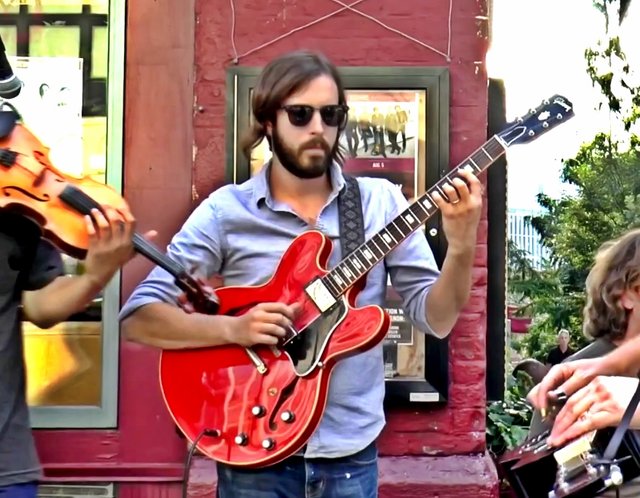
Early Exposure to Music
AB: What kind of music were you hearing at home, and what are some of your early musical memories?
Mike Seal: My parents filled the house with music, they had a pretty solid record collection. My dad, who doesn't play, is a lover of all things guitar, especially old blues players and classic rock. So he was playing anything from early blues stuff, all the way through to what he still kind of listens to now, which is the Allman Brothers – a lot of Duane Allman playing around the house. He was a major fan of Jerry Garcia, although he didn't call himself a Dead Head, he just loved Jerry Garcia's guitar playing. He referenced how it reminded him of jazz and different styles of music.
So there was a lot of that going on, he was a big Eric Clapton fan too. So there was a lot of blues stuff, but we didn't really take to that early on. My Mom too, she played the radio for us all the time, so we were constantly hearing music. She was still playing piano, and she can read fairly well, so she'd read through classical music and we were exposed to that as well.
Big Brother
AB: How about your brother, was he teaching you, or were you basically on the same level?
Mike Seal: He's four years older, so I was pretty much just trying to imitate him. There wasn't a whole lot of interaction early on. He was working on things that were much more advanced, I remember him playing (Beethoven's) “For Elise” on a steel string guitar. I remember having the same reaction that I had listening to my grandfather, I couldn't believe someone being able to do that.
So I was pretty inspired at a young age by that. But as we got older, I remember he got his first electric guitar when he was in high school. I was so obsessed with that guitar! I would get home from school earlier than he would, just because of the bus route, and would go into his room and play it in secret. And I remember breaking a string when he had only just had it for a few weeks, and I left a dollar bill, it was probably the only dollar I had, and I left it in the strings and put it back in its case, I was so terrified. Of course he was mad when he got home.
Later on when he went off to college, I started studying with a guy in Harrisonburg, Virginia – Mark Wetsel. He was a really profound teacher, and still is today. He had publications online, and he's a really great technician and he understands theory, and mainly he turned me on to all kinds of music. So my brother heard that I would going through a pretty stark period of improvement from where I was at, so ever since then we've had a great musical relationship, and we play every time I go home. He's so steeped in bluegrass, that's something that he can share with me. Feeding me records and teaching me about the tradition, and teaching a lot of songs on different instruments.
AB: What a great thing to have an older brother like that, and you can turn each other on to things as you grow older. Was he in band in his teenage years?
Mike Seal: Yeah, he went through a kind of classic angry teenager phase, and he was playing both in hard rock and metal bands, with giant stacks that we had never really seen before. At the same time he was doing a heavy metal show at the local radio station, while he was still in high school. So I really looked up to him for all that. But yeah he was very much into hard rock and metal at that time, and he kind of went full circle into bluegrass now.
Grunge & Beyond
AB: How about you in those early years, what were you listening to for your own edification, or things that you were trying to learn, or things that really captured your imagination? Maybe from 10 through 14.
Mike Seal: I had my first electric guitar, and that was sort of the grunge era and I was really into Nirvana and Soundgarden and any kind of band in that genre and stuff I was hearing on the radio. We were still going down and buying tape cassettes, this was probably 1995. So a lot of that AC/DC, Weezer, and those kinds of rock bands, and that was really my first experience of trying to pick out music by hear. Then that turned into Led Zeppelin and some of those early bands.
AB: Who would you consider some of your earliest influences?
Mike Seal: In terms of guitar, my first guitar heroes, that didn't really start until high school. But in those early years, certainly Kurt Cobain, I wanted to play guitar like he did when I was in 4th through 7th grade.
High School & Jazz
AB: High school?
Mike Seal: That's when I started studying with Mark Wetsel and every week when I'd come in he would feed me records, or turn me on to records to buy. Then it became Pat Martino, Pat Metheny, John Scofield, Mike Stern, Bill Frizzell, John McLaughlin, Wayne Krantz – he introduced me to all of those guys in a brief period of months, and I just became obsessed with that music.
AB: He was probably able to show you what they were doing to some extent right?
Mike Seal: Absolutely, he's a really gifted technician. So I went in knowing how to read music, and that was about it. A friend had played me some music by a band called Dream Theater, I was about 13 or 14. I knew he was a great jazz player, but I wanted to learn to play like (metal guitarist) John Patrucci, so I told him that and he kind of laughed. The next week when I went in, he handed me all these great CDs and exposed me to jazz. So it became a love right from the start.
AB: That's a tremendous bit of luck when you get a teacher like that early on.
Mike Seal: Absolutely, I probably wouldn't have gone as deeply into music as a career choice if I hadn't had that exposure.
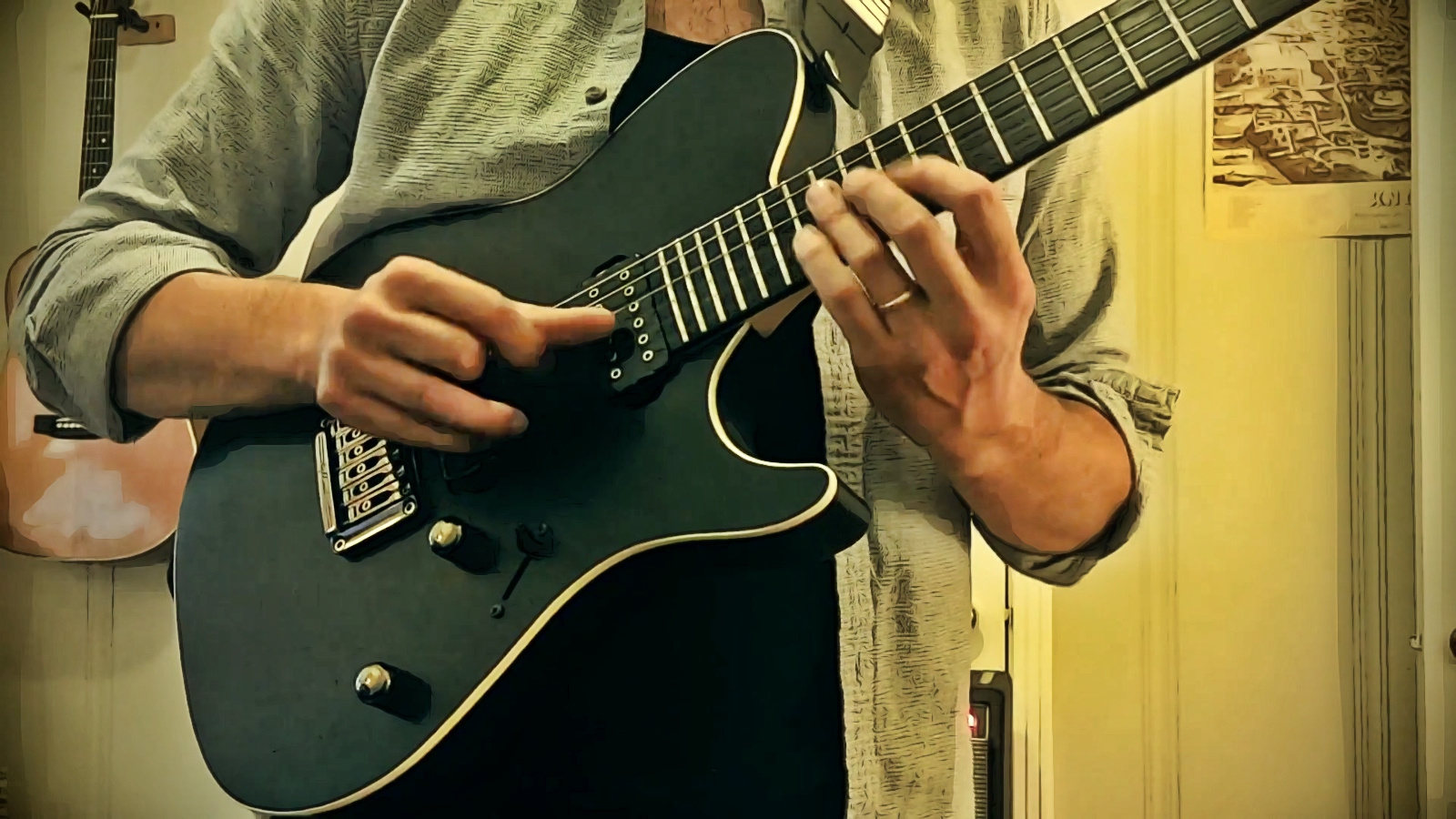
No Picks
AB: Here's the thing that's interesting to me Mike. When I first saw you play on clips with the Jeff Sipe Trio, I thought, well judging by his technique this guy has got some really serious training, but you play so unusually. Now I understand why. As far as I can tell from watching, you rarely use a pick, you use your thumb, index, and middle finger, is that right?
Mike Seal: Yep, that's correct, in fact, I couldn't use a pick to save my own life. That came very much by accident and has a lot to do with that early teacher, Nancy Hackman. We were reading classical music for guitar, we started with Mel Bay and started going into actual pieces, and she would give us Fernando Sor pieces – and those pieces were actually for a higher level of repertoire for a classical player. If it was a single note line, we would just play the entire line with our thumb, and she didn't really known enough to tell us what proper technique was. So it largely came from that, and from listening to rock songs, I realized that I could use my first finger and fingernail to imitate a pick, and I realized I could do up and down strokes like that.
That worked for me at the time, and I kind of stuck with that for strumming. Even when I went to my teacher, Mark Wetsel, who was really knowledgeable, he tried right away to get me to switch over to using a pick. I tried and I worked a couple of lessons with it, and I was making headway, but I was stuck on playing with my fingers. And granted, the tone was really bad, really thin at that time, and it's something that's been a lifelong pursuit to get a better tone with just playing fingers – flesh and not using picks or thumb picks. But eventually my teacher embraced it and now he even does a lot of finger style playing in the same way.
So there was never really any technique written down for me to study. I didn't adopt the classical PIMA, I just kind of bastardized my own way, and it's been good for me, and bad for me in other ways. So it's still a lifelong study.
AB: The thing that I like about guys who play like you do, another person who comes to mind is Derek Trucks, you both have your own truly unique sound.
Mike Seal: Sure, and there's so many great finger style players out there, and you're right, the variety of tone is pretty amazing – let's say from someone like Derek Trucks to Kevin Eubanks on the other hand, and Mark Knopfler is somewhere in between.
AB: I want to ask you about a solo you did on a jazz album for Keith Brown. It's interesting, you never use a pick, but you were able to get a pick-like sound on that solo.
Mike Seal: It's something I've been working on a lot the last couple of years, and it's something I should have been working on years before. It became really important to me to be able to articulate every note, and it sounds like a super basic fundamental thing, but honestly I had cheated a lot growing up. I think I put a lot of focus on my left hand and not on my right hand. At some point I realized I wasn't able to articulate lines super clearly, and that's one of the cool aspects of a pick, such clear articulation. So it's just something I've been slowing down, and as a finger-style player you can pick up a lot from watching people like Bela Fleck (banjo) and finger-style guitar players, and bass players too, like Oteil Burbridge and Matthew Garrison. Just watching their right hand and hearing how clearly they articulate. It's something I've been working on a lot, but it's also something I continue to work on.
Slide Guitar
AB: Have you ever played slide guitar?
Mike Seal: I have, and I've done it as requested on certain gigs, if there's a part that needed slide. Actually, I remember being on the road with Jeff Coffin years ago, I think Jeff Sipe was on this gig too, with Felix Pastorius on bass. We were out in Arizona somewhere, and Jeff Coffin really wanted a slide part. It was on this one song, and it was just one note, and it was because there was a trombone on the record.
So he wanted it to sound like a trombone, and I said man I'm sorry, I don't have a slide. We were at sound check getting ready for the show, so he had someone go to a music store and buy me a slide. And keep in mind, it was just one note from an entire show. So whenever that note came up I would get the slide out, and he would smile real big at me. I'm not sure if he was laughing at me, or with me.
But if the song calls for it, I think it should be there. I've got a ton of slides laying around, but it's not something I pick up all the time.
AB: What's that like for someone who plays dobro to play the slide? I imagine Jerry could probably play slide?
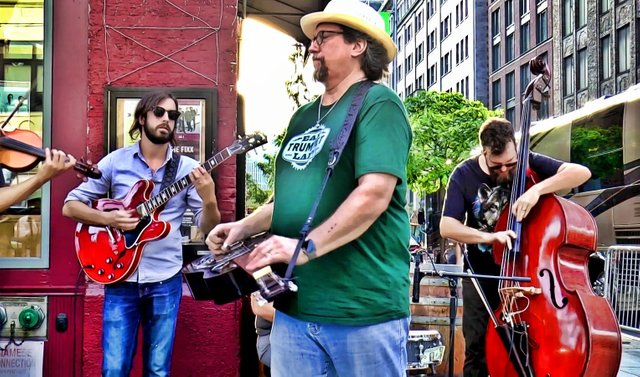
Mike Seal: Oh I'm sure he could. The mechanics of it are different of course, because a dobro is a horizontal instrument in your lap, and it actually fits very ergonomically with your natural wrist position. It's actually pretty comfortable. On a dobro you're using a heavy steel bar. On a guitar, you're likely using a glass or very light material. With a dobro you let gravity do all the work. The bar is heavy enough that you can just let the bar sit on the strings. Of course you have hand control, but holding a guitar upright your mechanics and technique would be a lot different.
I do think there's a lot of translation between the two, the neck is fundamentally the same on both instruments, except a dobro has extremely high action. You can't actually fret those notes. You know I was watching a video the other day of somebody talking about Derek Trucks' slide technique and he was suggesting he actually frets notes with his slide some of the time. That was an eye opener for me, I'd never thought about that.
AB: Nor had I. Derek plays in open E all the time, even when he's playing straight guitar. How in the world do you get minor chords and stuff, I guess he must have transcribed all that and figured it out.
Mike Seal: Yeah, but even just from a music theory perspective, and it's similar with dobro because they play in open G or D most of the time, but you can find intervals within those strings that will make those minor chords, sometimes parts of the chord and not the whole voicing.
Jeff Healey & Django Reinhardt
AB: Did you ever watch videos of Jeff Healey playing guitar?
Mike Seal: I've heard more than I've seen. He's someone my wife is really into.
AB: The thing that's really fascinating about his approach is that he was blind and played on his lap. But it was fascinating to me because he used his thumb on his left hand. Of course people with good training use four fingers, but he was actually using five fingers. Tapping back and forth between his thumb and his fingers, that's how he was able to do some of the things he was doing. An amazing guy.
I don't know if you know this, but he also had a Dixieland band that he was crazy about and he played trumpet in that.
Mike Seal: I did not know that. I'm going to have to go find that. You know the first time I saw Jeff Healey was in that Patrick Swayze movie “Roadhouse” where he's a bouncer and they've got chicken wire around the bandstand. And Jeff Healey was the house band in that movie.
So at the time I saw it, I was living in a house in Knoxville with a bunch of musicians. I had a roommate who was playing music full time, and he said, “Oh you haven't heard this guy! You've gotta check him out and listen to his music.” What a great player. That's cool with the technique that you mentioned.
There's so many musicians out there who use totally unique mechanics to play their instruments. Like Django Reinhardt who lost fingers in a caravan fire accident. But how many guys have emulated his technique even though they have all their fingers, but were just so engrossed with his playing that they were playing as though they had lost fingers.
AB: I just can't fathom that he was able to play like that.
Mike Seal: So clean and precise.
Jeff Sipe Trio
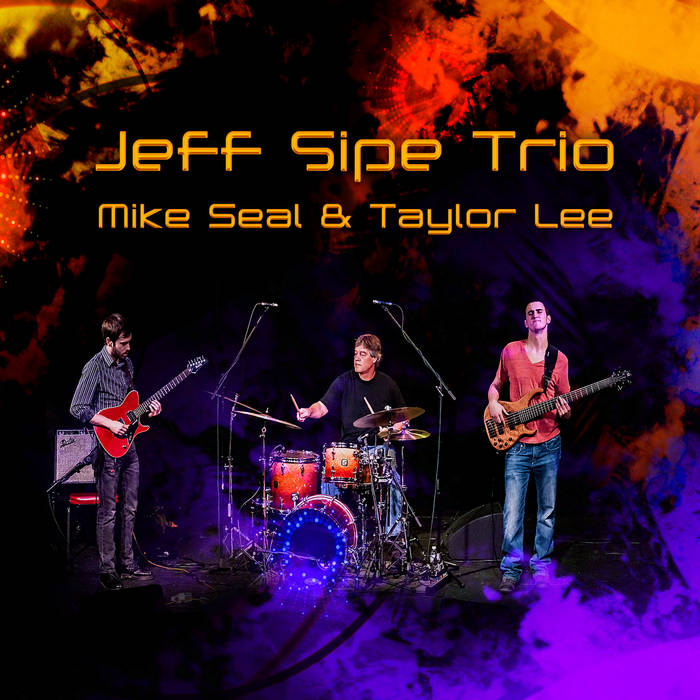
AB: I want to share something of you playing with the Jeff Sipe Trio, and I've got to say that is a really great album. The album version of this is somewhat subdued and has an intimate feel, but this particular clip was at some kind of a festival, and it's very high energy and quite a contrast to the recorded version. This is with Taylor Lee on bass, and Jeff Sipe on drums.
Note
This is an excellent album, it's a guitar trio which showcases Mike's playing. You can get a digital version or physical CD here.
Soloing / Influences
AB: Apart from guitarists, in terms of soloing, who are some of the musicians who influenced your approach to soloing?
Mike Seal: Oh, absolutely a lot of the jazz players. Now all kinds of instrumentalists, but at that time I was listening to a lot of jazz, post bop, bebop, free jazz – anything I could get my hands on. I felt like I was on a quest to know every record, which of course you can never do, but a lot of horn players, I was going through Charlie Parker's music, and the classic jazz albums from the 40s through the 70s and 80s. People like Chris Potter and Kenny Garrett were a major part of it, doing transcriptions, a lot of piano players, gosh Michelle Camilo, who I transcribed a lot, more than I can remember. But a lot of horn players, piano players, and just anything I could get my ears around.
Jerry Douglas
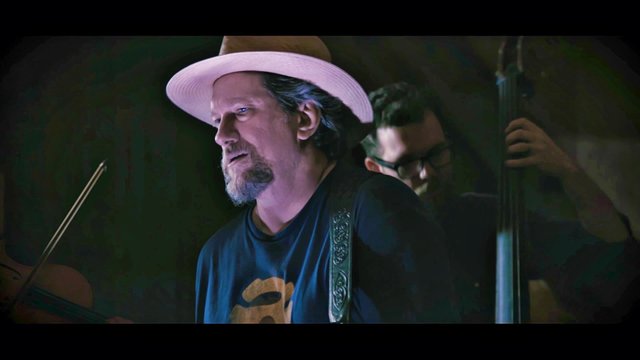
AB: Now you're with the Jerry Douglas band, in case there is someone out there who is completely into jazz and doesn't know the name, Jerry Douglas is a virtuoso Dobro player, and I think he's got at least a dozen Grammy awards.
Mike Seal: It's hard to tell from reading the Internet, but I think the last total I heard him give was 15.
Jerry Douglas Band
AB: Amazing! When did you first become aware of Jerry?
Mike Seal: My brother Rob got into bluegrass coming out of college, so for me that was leaving high school and coming into college. So my first exposure to Jerry's music was when I was probably 17 or 18, and I was completely blown away by it. If you listen to his solo records, he mixes so many styles of music.
He comes from the tradition of bluegrass, and is renowned in that area of music, but his own records reflect so much more than just that style. His influences are coming from Weather Report and all kinds of jazz players, and he takes that back to acoustic instruments, and hearing that was really a mind blowing thing. Of course he's on so many records, it's kind of like the incestuous nature of jazz projects where you'll hear the same player on 15 different projects, and variations of groups. So I really dug that about the bluegrass players too.
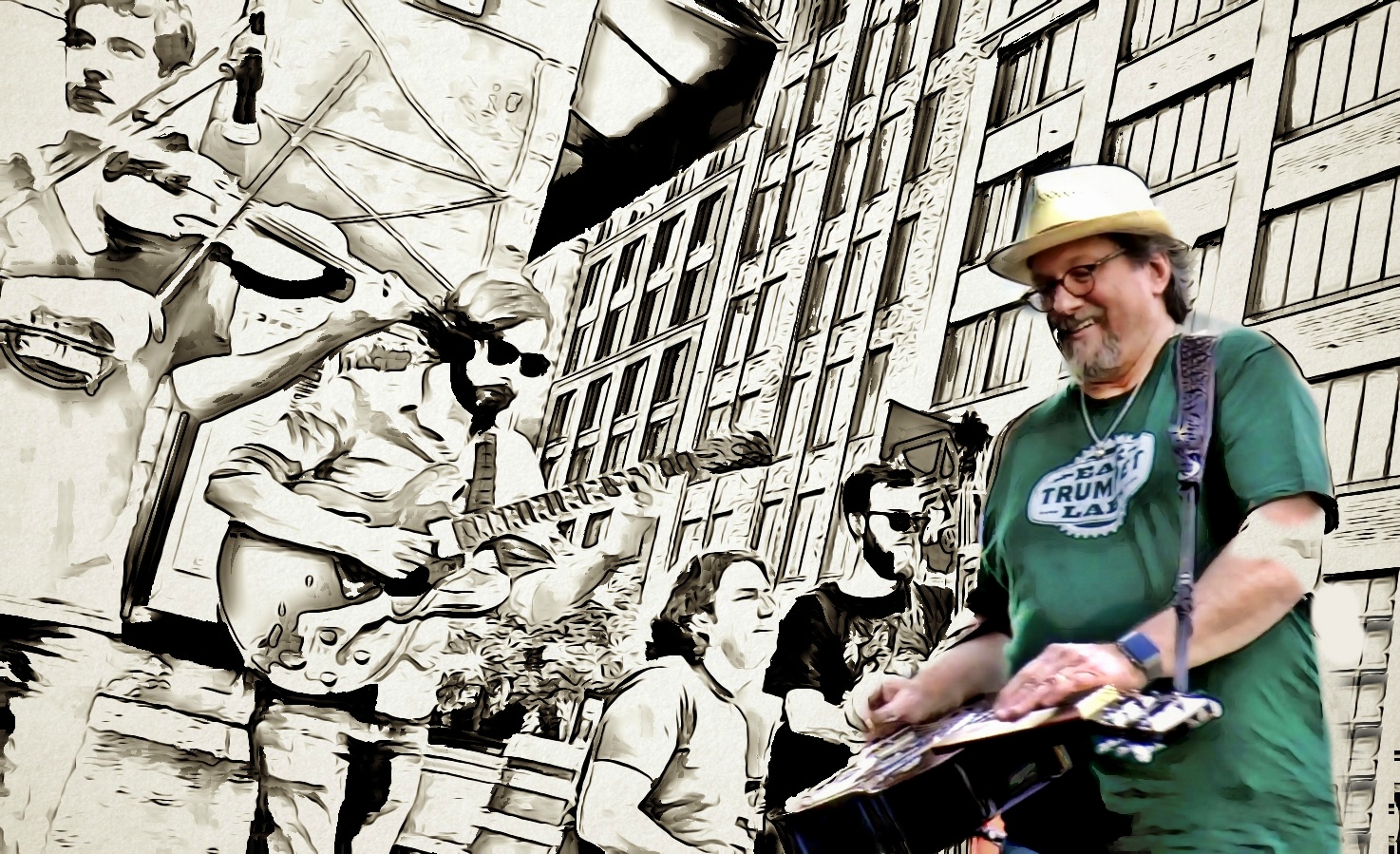
AB: That's true what you said about Jerry, you really can't fix him to any one particular genre, it's great, working with him, what more could you want?
Mike Seal: Yeah, I have to pinch myself.
AB: It's got to be a challenge too, here's a guy who's played with Chet Atkins, Bill Frizzell...
Mike Seal: Just a couple of months ago my buddy gave me a Ray Charles country album with extra unreleased cuts, and he had mentioned to me that he had heard a dobro on one of the tracks. So he called Jerry and asked if that was him, and Jerry said, “Yeah, I'd forgotten about that.”
AB: I wondered too, he's played with so many guys who came out of the chicken pickin' tradition, so are you into that?
Mike Seal version of "The Claw" by Jerry Reed
Trial by Fire
Mike Seal: I'm in awe of that whole style of guitar playing. I came to it late, so I wouldn't say I'm steeped in that tradition, but it is something that I work on. You known, just getting into Albert Lee and Johnny Highland, and watchin' videos of James Burton and these guys playing and trying to decipher what they're doing is a great joy and pastime for me.
I think the expectation for me coming in, it was kind of a trail by fire, I got a phone call from Jerry, and I screened his call because I didn't know who it was. I heard the message and got really excited and called him right back, and he asked me to join his group, and the first gig would be Telluride Bluegrass Festival. A very famous festival for people who love that music. Some of my own musical idols were going on before and after us. As he described it, he said, “Man it will be a trial by fire, because there won't be a rehearsal.”
AB: Oh wow.
Mike Seal: So he sent me an email with maybe twelve songs in it, and I had a couple of weeks to prepare. The bass player who is an old buddy of mine, Daniel Kimbro, helped me out too, and sent me some more of the songs. I also did some homework online. But it was basically meeting Jerry the morning of the gig, and we played through a couple of things at his apartment and then we went to the stage.
AB: Holy smoke...
Mike Seal: So there was very little instruction about how I was expected to play, so I knew I needed to know the songs, and know all the parts, because the songs are comprised of banjo parts that wouldn't be onstage. So you're hearing stuff on the record you know won't be on stage, so there's some deciphering involved to find your right spot because quite a few of the tracks don't have electric guitar.
So once he told me it was okay to just be an electric guitar player and not play acoustic, I relaxed and did my best to just be myself and do my best to incorporate whatever I've heard from different styles that would fit.
AB: The thing about it is, and I know you're too modest to say it, but I studied the video of that gig closely, and he closes his eyes, rocks his head, and broke a smile, so I think it must be good chemistry.
Mike Seal: It's so fun, and he's such a seasoned professional, he's played in all kinds of different circumstances, with all kinds of players, so I think very little would surprise him, but he's there for the fun and adventure. It's a great feeling to be on stage with him.
G Bender Twang
AB: I'm curious, have you got a guitar yet with a G bender?
(If you aren't familiar with a G bender)
Mike Seal: (Laughs) Man I'd love to have one. That's something I always wanted, but haven't got one yet. But you know, the famous Gruhn's Guitar Shop is not far from my house, so you know, maybe it's something to consider for the near future.
AB: That's a really cool sound.
Mike Seal: Absolutely, I've seen some that have a B and a G bender, but then your guitar's got a full suspension with a strap. Something I'm really intrigued by are players who achieve a pedal guitar sound without a bender or pedal or anything that would aid, but just by bending the strings. I've seen a bunch of different approaches to that, and it fascinates me as a guitar player.
Jerry Douglas is Everywhere
AB: I remember the very first time I heard Jerry Douglas. I didn't know who he was, but there was a guy Dan Seals who had a song called “Headin' West” with great guitar solos and trading licks with a dobro. I didn't pay any attention to the credits, but I just thought, wow, that's great. Years passed and Jerry became a star and I heard him play, and that rang a bell in my mind...
Mike Seal: (laughs knowingly)
AB: I thought, wait a minute! I went back and checked the album credits, and sure enough it was Jerry Douglas.
Mike Seal: Very cool.
Dan Seals with Jerry Douglas
Mike Seal: The violinist Mark O'Connor (clip above & below) is also a fantastic guitar player. For anybody out there who is not familiar with him, there's a record he does of just all guitar. It's blistering, just scary as hell, because he's already such a talented violinist, working with the world's masters, and then to hear him pick up a guitar, it's just kind of frightening.
“Spain” by Chic Corea - Mark O'Connor (guitar), Bela Fleck (banjo), Jerry Douglas (dobro), Mark Schatz (bass)
Solo Album?
AB: Any chance we'll see a Mike Seal album on the horizon?
Mike Seal: I hope so, I write all the time. I've got everything set up so I can plug and play record. I've got a synthesizer set up so I can get a lot of sounds from it. All the other instruments, there a ton of guitars around, slide guitars. So it's all hooked up ready to play, and all these years I've accrued a lot of demos, but the hard thing is finding the time to do it when you're working with so many bands. And also making a concrete decision about what kind of album I want to make. I do feel like for me my head is kind of spinning, because I do love all kinds of different music, and it's inspiring for me to try and write in those different styles – but it might not make the most congruent record if one track is a jazz track, the next some kind of chicken pickin', and then a classical thing.
So trying to find some kind of unified focus is a prerequisite for doing it.
AB: Let's say you won the lottery, and finances were no longer a consideration, what would your project look like?
Mike Seal: This is something I love to think about, especially the lottery part. What I've done is I'll have a list on a piece of paper, the players who really inspire me and who I think I might could hire. A lot of them are guys I've been lucky enough to work with, and some are peripheral to those I have worked with.
So I'll just write down some people I'd love to have on at least one track. Derek Trucks, Bele Fleck, Jeff Coffin, Jeff Sipe, bass my buddy Taylor Lee, Oteil Burbridge – the list is way too long. Jerrry Douglas for sure. The things is, it's a really weird mix of players. So what I do is write out a master list of people I think I could get for something, if the quality of the music was good enough.
Then I'll write out a ten track list, and just sort of group those players together, and try and imagine what that would sound like. Then I'll work on writing some music with that as a focal point.
Time is the Prize
AB: Let's hope you win the lottery! But in a way, you did kind of win the lottery with the gig you've got right now. The other nice thing about it is that Jerry plays in so many bands and combinations himself that you're not in a ball & chain situation where you're touring 250 nights a year doing the same songs every night. So you come together and have fun playing together, but he's got so much going on you have time for other things too. It's great.
Mike Seal: Absolutely. I spent the last year out with a kind of Americana band, the Black Lillies. It's a great group and they do very well, I think they've played the Grand Ole Opry 32 times at this point, more than any other independent band in history. They stay on the road for about 200 days a year, so I stayed on the road for ten months with them like that.
The Black Lillies, Mike Seal solos at about the 2:50 mark
That was traveling around with an eight man crew in a 15 passenger van hauling a trailer. So elbow room was a premium. It was a great experience for me, being on the road that much, I thought about Jeff Sipe and Oteil being out with ARU for 200 days a year playing music at such a high level – and it may have even been more than that. Basically they would come home, do laundry and get back out on the road for weeks.
My wife is also a professional musician, and she tours in Europe quite heavily. She (Megan Lovell ) is going back on the road with Elvis Costello in a week or two, so with her being gone and me being on the road that much wasn't really the perfect thing. The music was fun, but like you said, you're playing the same music every night, and really honing in on one show. So the situation with Jerry is exactly what I was hoping for. So we work about a week out of the month, and then you have the time to be engaged in a lot of other things.
AB: That's great. What instrument does your wife play?
Mike Seal: She plays lap steel guitar and dobro. In fact, when she was 17 Jerry Douglas invited her to be a part of the Tut Taylor tribute album. So she had a track on there when she was just a kid. She was playing with some really fantastic players.
AB: That's kind of interesting, she's playing with Elvis Costello and you're playing with Jerry, and Jerry and Elvis Costello worked together before.
Mike Seal: That's right. It becomes a smaller and smaller world, that's for sure.
Elvis Costello with Larken Poe (Megan Lovell on lap steel)
AB: Of course Elvis Costello has worked with so many greats, Paul McCartney, Burt Bacharach – I don't know if you've ever heard it, but his album with Burt Bacharach, the songs are fantastic.
Mike Seal: Absolutely. Elvis is like Jerry in that he collaborates with so many people with such a wide range of styles. Hats off to him, he puts on a really intense show, as long as he's been doing this, he still goes out and plays for two or three hours a night.
Bach
AB: Something else I should mention are the wonderful classical music clips you have on your Facebook page. I want to play a piece you did by Johann Sebastian Bach. Could you share a little about how that came to be?
Mike Seal: I had played that piece piecemeal over a couple of years, but I'd never worked it up all the way through, so it was just a project. I wanted to do a video to post, because you see so many great videos when you go through Facebook and YouTube, so it's a great inspiration for me just to see what other guitar players are doing. So I wanted to do something like that, Bela Fleck did a great version where he changed the key to fit banjo, and the who's who of classical violinists have recorded this piece, but I hadn't heard an electric guitar piece where it wasn't full on metal distortion.
It was a fun project for me. I did it when I was with the Black Lillies, I had like a five day window to do it, and it took me four days just to memorize it. I really should have given myself more time. I wanted to play it fast, it's faster than the other versions you'll usually hear. Not incredibly faster, but I think I rushed myself a little bit. Also, when I recorded it, I had to be out the door for a tour, I was already late, so I had to rent a car and return it to a different city so that I could finish that recording – I just didn't want to leave without it being done.
So the first time I got through without dive bombing was the take that I used. I realized later the audio clips a little bit, and I probably didn't take the time I should have, but hey it was a lot of fun, and it's something that I'll continue to work on and try to clean up.
AB: There's another clip of you and your buddy Jonathan Keeney who plays pedal steel, and you guys are great together. I was curious, does he play jazz too?
Mike Seal: He does, he's a great jazz guitar player. He was playing mandolin when I met him in Knoxville, Tennessee, probably about 11 years ago. We were playing in a bluegrass band with some buddies around town. I was playing dobro at that time actually. I've had one for a long time and I really love playing it.
But Jonathan went through jazz school and is a really gifted guitarist, and he played pedal steel with the Back Lillies, the band I was on the road with so long. So he found that piece and said, “Let's try this!” He printed a score, and we worked on it during sound checks on the road. So after we were both out of that group for a while, we got on the phone and decided to try something out. I think we're going to do some more in that Debussy vein.
AB: I know you must have heard that album with (guitarist) Lenny Breau and (pedal guitarist) Buddy Emmons.
Mike Seal: Oh of course, two of my favorite players.
AB: Man I tell ya what, that combination really works!
Mike Seal: It's a cool sound right. I feel the same way.
AB: So I hope you guys have that on your list of things to do one of these days. I'd love to hear that.
Mike Seal: Yes, that's definitely on the list.
AB: So on that note, I want to thank you so much for taking time out, and I know it's super hectic for you right now. It's been great talking to you, and when you do an album, get back in touch with me and we'll preview it and talk about it.
Mike Seal: That would be fantastic, thanks so much for having me Alan.
.png)
Notes
This audio interview appears for the first time in written form here on Steemit – made possible by @sndbox
Visit Mike Seal on FB (hopefully soon on Steemit)
Visit Jerry Douglas (hopefully soon on Steemit)
Notes is a Google image labeled free use, license free
All Photos are YouTube screen captures with effects by @roused
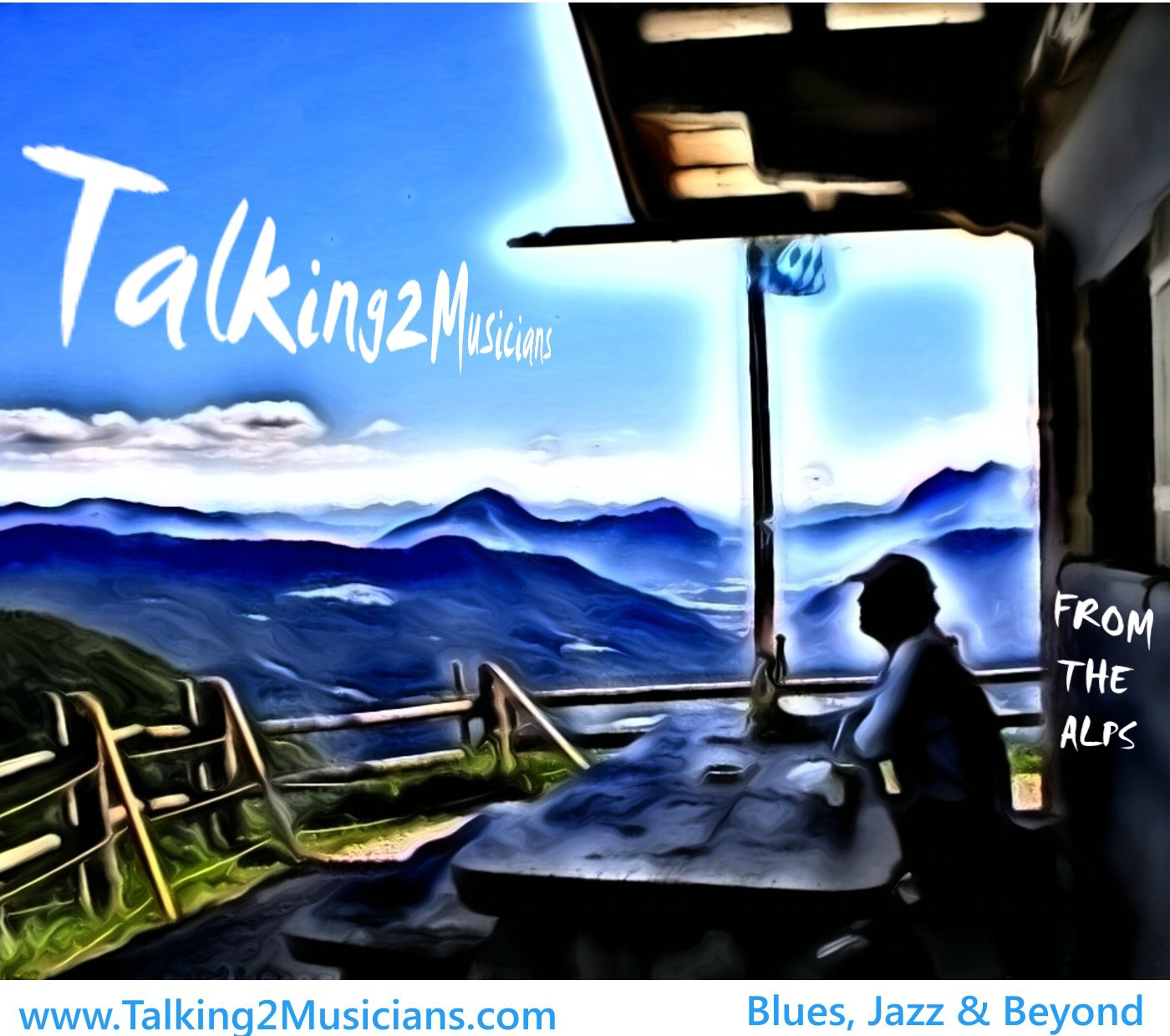

Wow Alan!
I absolutely love to read this kind of in deepth interviews with the most talented musicians on Steemit. I surely will check out some of Mike's and Jerry's music on spotify, although I would really appreciate seeing them joining and offering their music on the blockchain in the near future.
Thanks Jörn! There are real magicians in this world, they are musicians -- art created with vibrations in the air -- what a gift.
I agree, with time musicians will change the way we use steemit. There is tremendous potential. It would certainly be great to have Mike and Jerry on the blockchain!
OK, so I finally found the time for this odyssey through jazz-bluegrass a thing I didn't even knew existed. My musical taste is to broad to keep track of everything that happens out there, but Jerry Douglas will be homework from now on.
Cool how you go into technical details - with the finger play I got to think of Wes Montgomery who played everything with his right hand thumb! Almost as impressive as Jango :)
Great Steemit post - not one letter too long - I bought the trio album on Bandcamp and will be listening to it the rest of the day.
Wow, that's wonderful, and I really appreciate you investing the time on something unfamiliar to you. Also that's fantastic you got the "Jeff Sipe Trio" album.
They have perhaps the best version of John Coltrane's "Naima" that I've ever heard. The young bass player, Taylor Lee, is also an extraordinary player.
Cool you know Wes & Jango too ;-)
I often take time of to listen to something unfamiliar - I really like the album (and the Naima) - I think Seal has a light, sweet tone and first of all: he has real swing. It is like the country boy that comes to town and learn all its ways but never gives up his rural dialect. The two others are great too - I'm very happy for that purchase.
I love jazz and did play tenor saxophone in gymnasium. We listened to the grandfathers of Seal - Scofield and Stern on the Miles Davis albums our seventeen year brains blown right through the roof, and then we heard Coltrane and bebop and Louis Armstrong and British punk and heavy metal... well that was where I learned to just listen to music instead of putting it into brain boxes.
:-) That's a great analogy about not losing the country accent. Labels are sometimes helpful, but I agree, just listening with an open mind is the best approach.
I was fortunate enough to have interviewed John Scofield, he's another amazing musician and a lot of fun.
New to Steemit? It's an ideal platform for musicians & music lovers.
Steemit Explained in 45 Seconds
Well done and well explained!
Congratulations @roused, this post is the third most rewarded post (based on pending payouts) in the last 12 hours written by a Superuser account holder (accounts that hold between 1 and 10 Mega Vests). The total number of posts by Superuser account holders during this period was 1599 and the total pending payments to posts in this category was $18847.10. To see the full list of highest paid posts across all accounts categories, click here.
If you do not wish to receive these messages in future, please reply stop to this comment.
Thanks bitgeek for the information and thanks to the steemarians whose votes make this content possible with their curation.
I love it dear Alan, it's an amazing! With all my respects👏👏
Thanks my friend, you've been very creative yourself these past few weeks ;-)
I'm a fan of classical music and listening in unconventional instruments is a novelty for me ... this post moved me ..!
Its true is captivating
Amazing interview! Thank you @roused
Glad you stopped by!
explicit!!!
all i can say is 'talent runs in the family and lots of inspiration and exposure as regards guitarists everywhere he is'
Have seen lots if guitarist perform but these style is different.
thanks for shearing @roused
You know we all needs a booster the post is really a source of inspiration
true
but unavailability of one doesn't mean we should relent
never giveup.
woooooooow this is cool i am also a guitarist a bassist to be precise this is reallly lovely
Thanks!!
Perfect job.. Music is the weapon of the future.. You've been doing a great job on here.. More success @roused